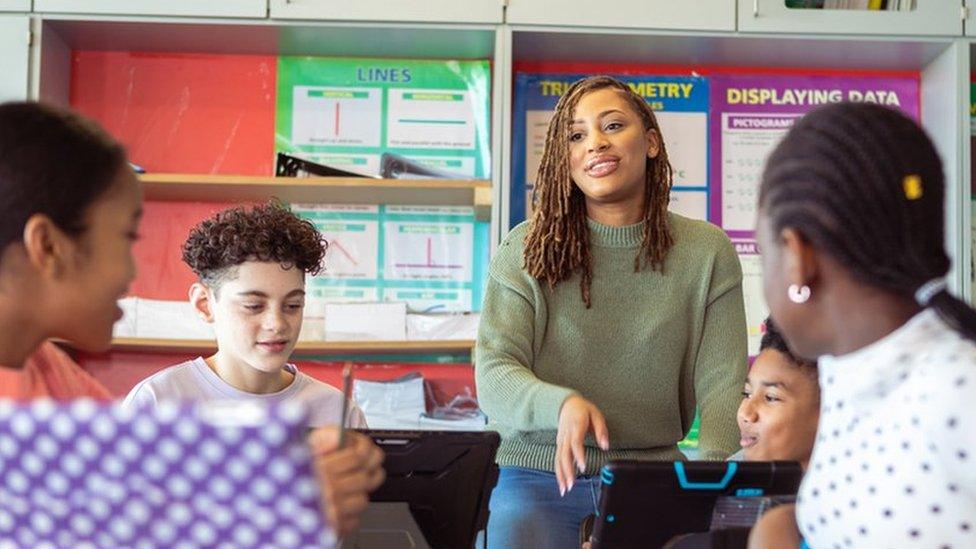Plan to ban sex education for children under nine
- Published
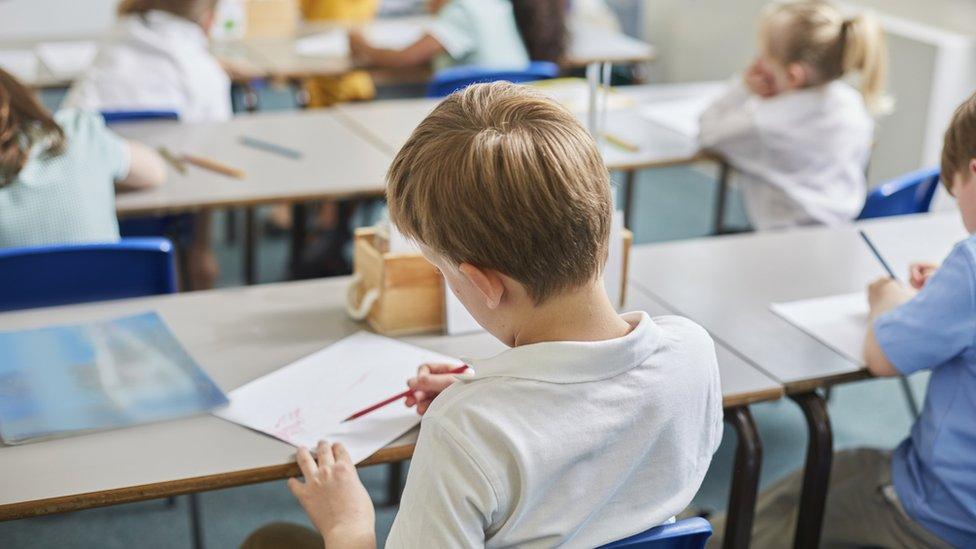
Schools in England will be banned from teaching sex education to children under nine, in new government guidance expected to be published on Thursday.
The BBC has not seen the new guidelines but a government source said they also included plans to ban any children being taught about gender identity.
Head teachers have said there is no evidence of a widespread problem with age-inappropriate materials.
One union has said the review is "politically motivated".
The statutory guidance on relationships, sex and health education (RSHE) - which schools must follow by law - is currently under review.
The government believes clearer guidance will provide support for teachers and reassurance for parents, and will set out which topics should be taught to pupils at what age.
'Rigid limits'
But Paul Whiteman, general secretary at school leaders' union NAHT, said: "If what has been leaked is accurate, the government must provide the evidence which unequivocally shows that such age limits will improve the support, protection and safeguarding of children and young people."
Many children already accessed information from outside of school, which might lead to teachers being asked about sensitive topics, he said.
"It is hard to see how rigid limits on what can be discussed and when would be in the best interests of young people," Mr Whiteman said.
The NAHT has previously said the review is "politically motivated" and there is no evidence to suggest a widespread problem of inappropriate content being taught.
Suffolk Primary Headteachers' Association director Rebecca Leek said the government's proposals would not make "that much difference".
Sex education was not typically taught until Year 6 anyway - when children turn 10 - and "parents already have a right to withdraw" their child, she told BBC Radio 4's Today programme.

What are the current RSHE rules?
Relationships education has been compulsory for primary schools since September 2020.
Children are taught about healthy, respectful relationships, focusing on family and friendships - including online and social media. They also learn about physical health, parts of the body, boundaries and puberty.
The government strongly encourages schools to include teaching about different types of family and same-sex relationships.
At secondary school, relationships, sex and health education is mandatory - and covers content on a wider range of key topics.
It includes sex, sexual relationships, consent, online abuse, domestic abuse and female genital mutilation (FGM).
In some cases, parents have a right to remove their child from some sex education lessons, but not from relationships education.

Pepe Di'Iasio, head teacher at a school in Rotherham and general secretary of the Association of School and College Leaders, told Today that he believes pupils are being used "as a political football".
Teachers "want well-informed and evidence-based decisions", he said, and not "politicised" guidance.
"All head teachers have to assess their curriculum and move their curriculum in order to cope with whatever might be the issue of the day.
"Whilst we welcome a chance to look at this, we also need the flexibility to respond to whatever those particular needs are," he said.
In a separate interview with BBC News, Mr Di'Iasio added: "Ten years ago, there was no need to teach about sexually explicit images being shared on social media. And three years ago that might have been delivered at age 14, or 15. And now, we're having to deliver that at age 11 or 12."
'Private parts'
The National Education Union, the UK's largest teaching union, agreed primary-school children needed to be able to discuss "with trusted adults" information they picked up online about relationships.
General secretary Daniel Kebede said the government was "seeding doubts" about whether school leaders and teachers thought carefully about how they taught about relationships.
One parent, in Banbury, Oxfordshire, told BBC Radio 5 Live her daughter, in Year 5, had been "quite upset" after being taught about the anatomy of "private parts".
Another, in Chester, Cheshire, said her Year 5 daughter had come out of a class "confused" about "how babies are made", thinking she could become pregnant if she "sat near a boy".
But an 18-year-old in east London told the programme there had been instances of homophobia and transphobia at her school "because it wasn't taught" about in primary.
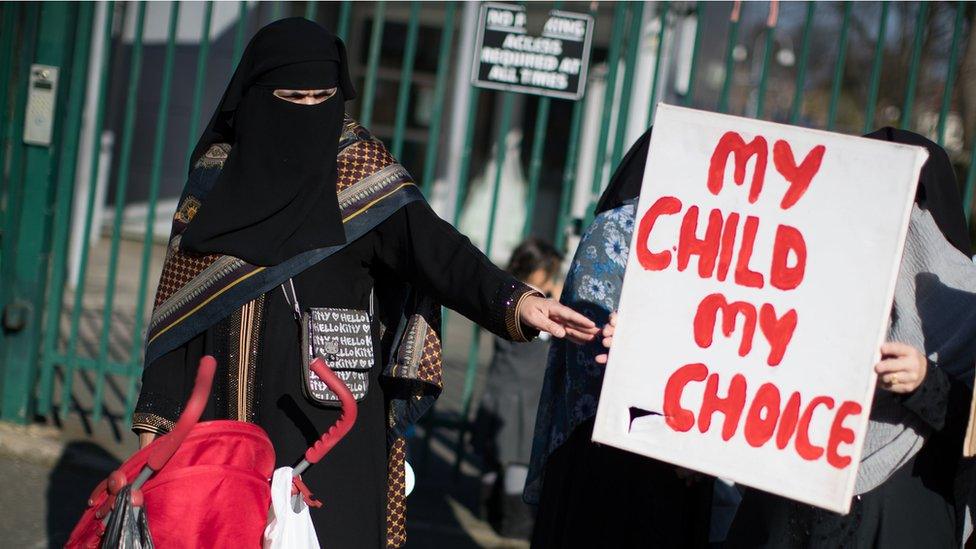
Parents angry about same-sex relationship education protested outside Anderton Park School in 2019
Schools have a duty to share RSHE materials with parents, when asked for them.
Jason Elsom, chief executive of Parentkind, said the draft guidance must encourage this "transparency" between schools and parents.
He said parents wanted to "protect the innocence of their children" and only teach them relationships and sex "when they themselves feel it is appropriate".
Other organisations are concerned about restrictions on sex education.
Lucy Emmerson, chief executive of the Sex Education Forum, said: "If topics were to be restricted it will leave children even more dependent on getting answers about topics from pornography, coercive control and STIs (sexually transmitted infections) from online sources."
The youth-led RSHE charity Sexpression agreed that since some nine-year-olds may have already been exposed to pornography, not being allowed to teach sex education at all would "negatively impact" them.
PSHE Association chief executive Jonathan Baggaley added that the new guidance must "reflect reality" rather than potentially "undermining" education designed to protect children.
Dolly Padalia, whose charity School of Sexuality Education delivers RSHE workshops within schools, said: "Sex and gender education, when delivered thoughtfully and sensitively, equips children with the tools to understand and respect themselves and others."
In 2019, head teacher Sarah Hewitt-Clarkson needed a court order to stop protests outside Anderton Park Primary, which later spread across England.
The protests - aiming to stop LGBT relationships education, with many parents and activists claiming it contradicted their Islamic faith and was not age-appropriate - were "utterly devastating", she said.
Five years on, Ms Hewitt-Clarkson told BBC News the forthcoming government guidance must "eliminate the grey areas".
'Two mummies'
She said the current guidelines included a "grey area" in its encouragement of schools to teach about LGBT relationships.
"It's what left people open to protest outside my school, thinking it was my choice as a head teacher to say some people have two mummies," she said.
"There should be no wriggle room.
"There should be nowhere and no way for people to say, 'you can't do that'."
Under current guidance,, external it is down to primary schools to decide whether they need to cover any aspect of sex education to meet the needs of their pupils.
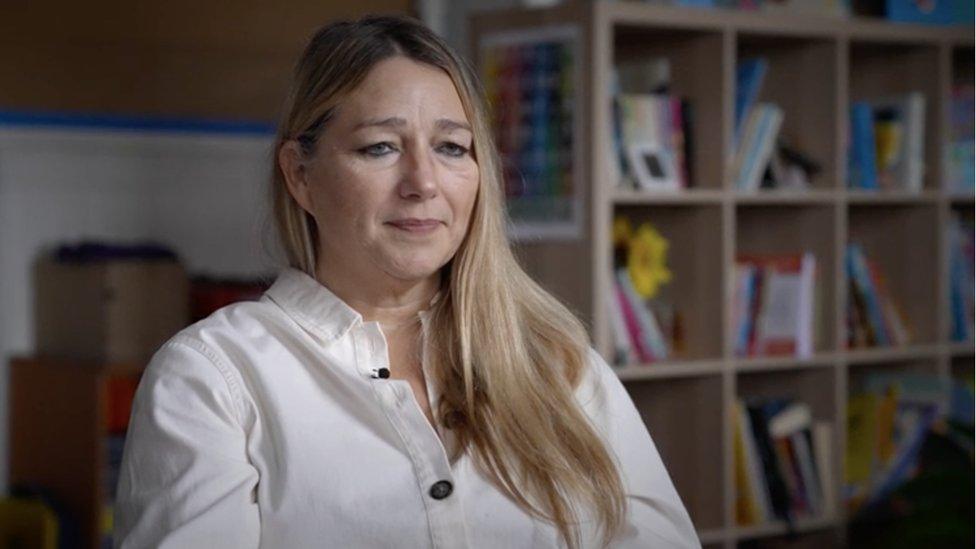
Sarah Hewitt-Clarkson needed a court order to stop protests outside her primary school in 2019
Last year, more than 50 Conservative MPs wrote to Prime Minister Rishi Sunak claiming children were being exposed to "inappropriate content" and "radical and unevidenced ideologies about sex and gender".
In response, Mr Sunak brought forward a review of the RSHE guidance. A review was already due before the end of 2023.
The government source told the BBC that the forthcoming guidance would say that teachers will be required to be clear that "gender ideology" is contested, if asked about it.
Separate guidance published last year stated teachers should inform parents if their child wished to change their gender identity at school. Unlike the RSHE guidance, the gender identity guidance is non-statutory.
In Northern Ireland, relationships and sexuality education (RSE) is mandatory for all pupils. Schools can develop their own policies.
RSE has been mandatory in Welsh schools since 2022. Guidance to schools sets out which "developmentally-appropriate" topics should be covered from age three to 16.
In Scotland, the government is in the process of finalising updated guidance, after a public consultation in 2023.
Additional reporting by Elaine Dunkley, Christina McSorley and Lauren Moss.
Related topics
- Published24 October 2023
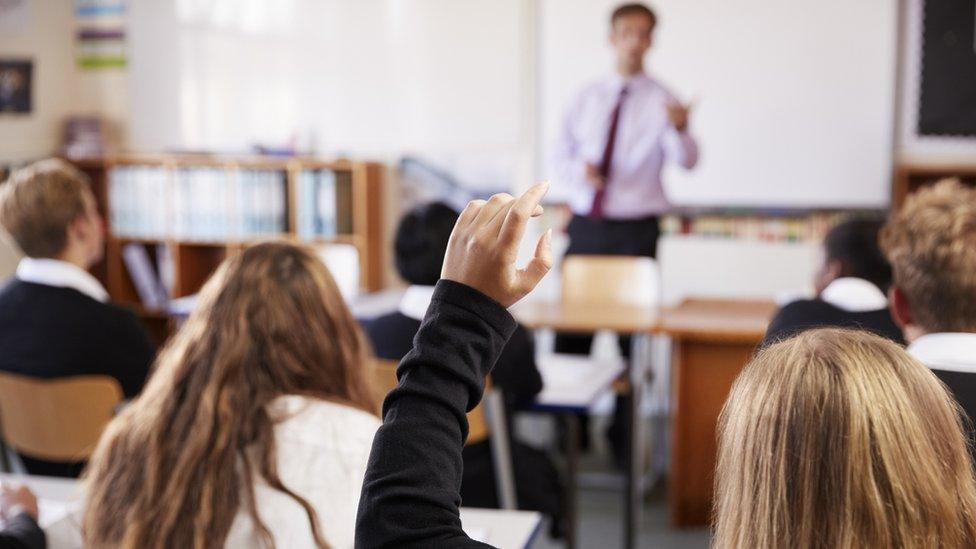
- Published19 December 2023

